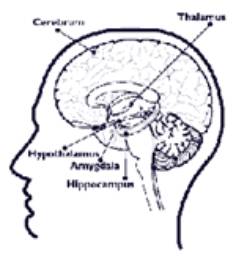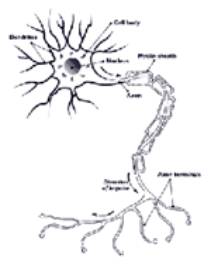|
from The Worldview Literacy Book copyright 2009 back to worldview theme(s) #18 |
| Discussion #18A: Acting on impulse means responding immediately to
a triggering stimulus with little or no conscious control or direction.
Most fundamentally, our brains—and those of all animals—are
structured to do this in response to danger.
We have an "alarm system" (centered in the amygdala,
part of the limbic system, Figure #18b) that can instantly prepare our
bodies for fight, flight, or (less dramatic) appeasement responses.
A quarter second or so later, the brain's cortex can evaluate the
alarm it receives, put it into context with other information, and more
consciously, rationally decide whether to activate a full blown survival
type response, or to dampen those preparations.
Indeed, our most
basic instincts—and most powerful emotions like anger and fear—can
operate without the conscious mind intervening.
In non-emergency situations such emotions are held in check by
the higher functions of the brain—regulation which works better in
some than in others. Some
suffer from impulsive behavior disorder—especially dangerous for those
unable to resist temptation to engage in behavior known to be risky or
harmful. The behavior of teenagers is of concern in this regard.
Since prefrontal lobes aren't fully developed until a person
reaches his or her mid-twenties. It's
been speculated that young brains are directed more by the limbic system
than they eventually will be. (The
cortex will assert itself as they age.)
Studies suggest that children who resist instant gratification
and are able to delay rewards have better adult lives.
Researchers have long hypothesized a link between
neurotransmitters—the chemicals released as the cells responsible for
brain activity (neurons) fire—and human personality types. Robert
Cloninger has suggested that the brains of extroverted individuals high
in "novelty seeking" (described as quick-tempered, curious,
easily bored, and impulsive) rely more on the dopamine behavioral
activation system than other neurotransmitter modulated behavioral
systems. While this has not
been demonstrated, research does suggest that how our brains respond to
environmental stimuli is more dependent upon personality than once
thought. It suggests that,
to the extent to which a person is extroverted or neurotic, his or her
brain will amplify certain experiences over others. #18B: Like
our "fight or flight" reaction to danger, many basic bodily
functions, needs and urges can be met without the conscious mind's
intervention—rather they involve unconscious, automatic responses to
environmental stimuli. For
example, if the hypothalamus in
your brain's limbic system indicates a "hungry" condition,
upon seeing food you will automatically eat—unless conscious, higher
brain functioning suppresses this urge.
(Perhaps you're on a diet!)
How much of what we do is the result of conscious,
deliberate decisions and how much originates in unconscious automatic
directives? Research |
Discussion—continued suggests that generally the contribution of the
unconscious component of our behavior is greater than was once
thought—but again this seems to vary with personality.
Some people are much better at suppressing urges, deferring
gratification and patiently waiting as necessary to carry out plans
they've formulated to meet goals—plans with subgoals and sub-subgoals.
David Stephens, University of Minnesota Professor of Ecology, has
studied animals "discounting the future"—
doing or consuming something now, rather than waiting.
He believes animals have "a
hardwired rule that says, 'Don't look too far in the future.'
Recognizing humans are physically not much different from their
ancestors—foragers who were not penalized for taking resources
impulsively —Stephens thinks he understands why many people have such
difficulty suppressing their "have it now" urges. Human ability to control emotions like
anger varies greatly. A few
become so
violently out of control that their passionate rage leads to murder! Reportedly one in three murderers claim they remember
nothing of their crime. Some
neuroscientists accept this and say it fits their belief that the
killers weren't really there: their conscious mind was absent when they
killed! Some better control
letting their emotions out: expressing anger constructively, being
objective, blaming or not blaming others as appropriate.
Still more "dispassionate" are those who fit the ideal espoused by ancient stoic
philosophers. They taught
the importance of self-control, reason, and courage in maintaining clear
judgment—especially during tumultuous times when one might otherwise
succumb to destructive emotions. In
general, stoics seek to maintain inner calm, have their lives flow
smoothly and evenly. Like
Buddhists, they believe life is potentially full of suffering brought on
by passions and desires. They
believe that removing these—especially distress, fear, lust, and delight—is
the key to having freedom. Figure
#18a: Stoic
Serenity
|
|
Figure
#18c
back to worldview theme(s) #18
|

